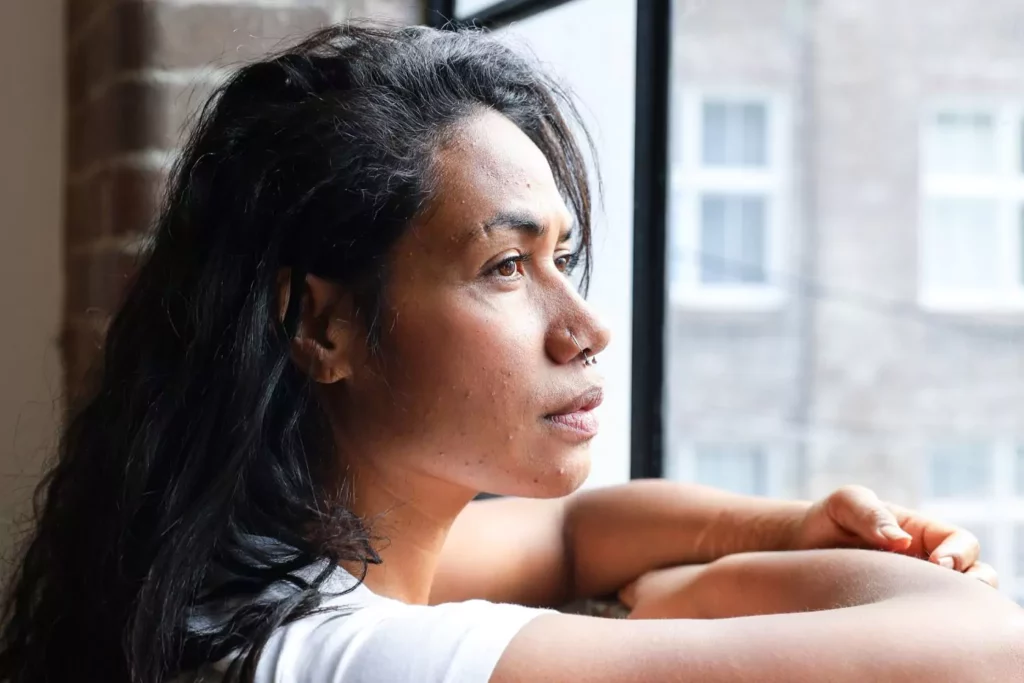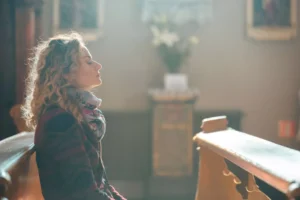At first the call was subtle, almost unrecognizable. For years I felt pulled toward pro-life ministries. I regretted my past and wanted to do something. I felt like such a hypocrite, working with my church’s Respect Life ministry. When others spoke of the horrible acts “those mothers committed,” I felt condemned. I couldn’t share with them that I had two abortions and wanted to spare others the pain I felt. Eventually, I quit the Respect Life ministry, feeling if that were where God really wanted me, I’d feel more welcome. Looking back, it wasn’t the community that made me feel unwelcome; rather, it was my own shame. Through continued faith formation and healing, God continued to prepare me for pro-life ministry.
Two years ago, His call was undeniably clear: I was to share my story with women and teens from behind a lectern. Each objection I thought of for not doing that was met with the sobering realization that women like me don’t share the ugly truth about the shame, blame and guilt we carry with us after our abortion. Most of us hide it from our friends, families and especially our children. I knew in my heart that God was speaking to me, and I had to share my story. Perhaps, had someone shared with me how her choice to abort had impacted her life, I’d have made a different choice.
I thought at the time I was well aware of all the ways my abortion had affected me. I knew I was ashamed of it. I felt guilty and blamed myself and others. I was sure I had completely forgiven myself and moved on. I would soon learn, as I embarked on my journey to begin sharing my story, that I had only scratched the surface when it came to understanding the many ways my choice had caused devastating effects throughout my life and my relationships. Here are five of the many lessons I’ve learned as I’ve dug deeper and allowed Christ’s healing and forgiveness to infiltrate my spirit.
Lesson 1: The risk of shame is inevitable, regardless of what I choose.
I barely recall the counselor inside the abortion clinic coaching me, saying, “And adoption isn’t an option, correct?” However, I do remember selfishly thinking that I could never carry my baby and then give him up for adoption. What would be the point? If I did that, everyone would know I was pregnant. My peers would ridicule me and talk about me. My parents would be angry, and once again, I’d have disappointed them. No, if I wasn’t going to keep the baby myself, abortion was the better way. At least then no one would know I messed up. Foolishly, I thought that by choosing abortion I wouldn’t be ashamed and embarrassed with an unplanned pregnancy and a boyfriend who left me as a result.
If I’d had a crystal ball, I might have seen myself in the future looking at the floor as someone talked about abortion at church, hoping no one would see my guilt. I would have known the deep shame I endured every time a doctor asked me how many pregnancies I’d had. Knowing I had to be honest for my own good, I would then drop my head as the flush of embarrassment heated my face and admit I’d had two abortions. I would have foreseen meeting a wonderful Christian man, falling in love, only to feel overwhelmingly afraid when I told him that part of my past.
While I thought keeping my secret would spare me from my parents’ disapproving glare, they eventually learned the truth. My mother stood in the delivery room as I was admitted to give birth to my son, and my joy and hope for the new life I was about to deliver was marred by the humiliation I felt as the nurse reviewed my history with me in my mom’s presence. I felt all the same fear, anxiety and humiliation I’d felt at 17 when I learned I was pregnant, as the nurse waited for me to confirm that I had two past pregnancies that ended in abortion. In addition to the fear and anxiety, I felt terribly guilty for not trusting the woman beside me, with whom I now had a mature adult relationship, when I had been faced with those pregnancies.
Lesson 2: Love doesn’t conquer all.
At 17, faced with an unplanned pregnancy, I was crushed when my boyfriend said he wouldn’t be there for me if I had the baby. I felt more desperate to hold on to him than to the life of the baby I had briefly hoped he might want. I already felt alone, and without him there to support me, I believed I would be sentenced to a life as a single mother. In my heart I wanted us to be a family. I wanted him to tell me everything would be OK, and we would get married and make everything work. When faced with the ultimatum of him or the baby, I chose him.
I didn’t know that when I walked out of the room where the surgery had taken place and saw him there waiting for me that I would hate and resent him. Nor could I have known that he, too, would feel anger and guilt. We both were confused by our intense emotions, and in the weeks that followed we lashed out toward one another in anger over the littlest of things. Within a month, we were barely speaking and ended our relationship.
Lesson 3: Abortion is a cycle that repeats itself.
According to the Guttmacher Institute, half of women aged 15–44 who have an abortion have had at least one prior abortion. At 17 as I struggled with my decision that ultimately ended in abortion, I promised myself I would never put myself in the same situation again. No one warned me that statistically it was likely that I would once again face an unplanned pregnancy. When it happened to me at age 23, only six years later, I was determined to keep the baby. I had a great job, owned my own townhome and felt I could be a single parent.
It didn’t take much for family and friends to convince me I was not capable of being a good parent and that my life would be ruined if I kept the baby. My prior abortion had stripped me of every ounce of self-worth. The more alone I felt by the lack of support I perceived was there for me, the more convinced I was that abortion was the only choice I had.
Lesson 4: The problem doesn’t just go away.
I thought that by electing to have general anesthesia, the second abortion would be easier. I had experienced some sadness and guilt over my first abortion, and I rationalized that it was likely because I had been awake through the procedure. I still remember the panic as I awoke. There was sobbing and crying in the background from the other women in the clinic. And the nurses placed a blanket over my head as they rushed me out the back door of the clinic because they believed the protesters outside were dangerous.
I went to my friend’s house and slept for two days and then finally went home to my empty house. That night I went out with neighbors and drank. Then I smoked marijuana — something I didn’t do or believe in — and I missed work the next day. Eventually, I put it behind me, or so I thought.
Recently, I’ve learned that there is much fighting between medical and psychological professionals about a condition called PASS (Post-Abortion Stress Syndrome) which is essentially a type of Post Traumatic Stress Disorder that occurs in women who’ve had an abortion. I can’t speak to the medical side of the argument, but I can honestly share that I’ve suffered many of the symptoms associated with PASS, including drug and alcohol abuse, depression, and an attempted suicide. I believe, based upon my own experience and the experiences of other women, that the reason we didn’t recognize we had PASS is because we had no idea that the lack of self-worth, depression, loneliness, self-sabotage, promiscuity, alcohol, drug abuse and reckless behavior we all experienced was related to our past abortion(s). The abortion(s) had been pushed so far back into our subconscious minds that without the help of a professional, we couldn’t have recognized their effects on our lives.
After my first miscarriage, a grief counselor first brought to my attention the possibility that I was affected by PASS. It wasn’t until I began healing and sharing my story that I realized that this type of behavior in my life, including the promiscuity that led to the second pregnancy and abortion, as well as my attempted suicide, occurred at the same time of year as my first abortion. Once I was married, deeply involved in my faith and had other children, I was no longer as susceptible to drugs, alcohol or promiscuity. I discovered, however, that I replaced them with other self-sabotaging behaviors, oftentimes triggered by the anniversary date of my abortions, that impacted my career, business and finances.
Lesson 5: I never had to do it alone; there was always help and support.
Perhaps the biggest lesson I’ve learned over the past few years that may have changed everything at age 17 and 23 is that I was never, ever alone. There are so many people out there with a heart to help young women who face a crisis pregnancy. As I look back, my greatest fear was always being alone, ending up homeless or not being able to care for my child. There are homes all over the country that help unwed mothers with a place to live, food, diapers, job training and daycare. There are crisis pregnancy centers that offer prenatal and medical care, sometimes for free and oftentimes for less than the cost of an abortion.
There are even resources for men and women who’ve experienced the effects of abortion. With the help of organizations like Silent No More, Rachel’s Vineyard, 40 Days for Life and Klemmer & Associates (where I learned to overcome my shame to share my story with others) I feel the peace of complete forgiveness through our Lord. Through that forgiveness I have much hope that the future has in store for us a world where more men and women break free from the chains of guilt, shame and blame, and share their stories about the harm abortion causes. I truly believe it’s our voice that can change the culture of abortion in our world today.
OptionLine.org is a website for women that offers online support, fetal development information, true stories of girls who’ve faced unexpected pregnancies and a confidential crisis pregnancy help line.
If you’re struggling with a past abortion, contact Focus on the Family’s Counseling Department Monday through Friday between 6 a.m. and 8 p.m. (MT) at 855-771-HELP (4357). Our counselors are all licensed therapists, and they would be pleased to assist you in any way they can. You can also go to their online help portal to request a consult via email.
My Choice Network: The easiest way to connect with your local pregnancy resource center.
Pregnancy Support Videos: Includes videos like
- “Abortion Pill”
- “What I Didn’t Know About Adoption”
- “Healing the Hurt” (Signs of post-abortive trauma and ways of finding healing):
- “Morning After Pill” and more.
Copyright 2012 Brenda Kilhoffer. All rights reserved.











